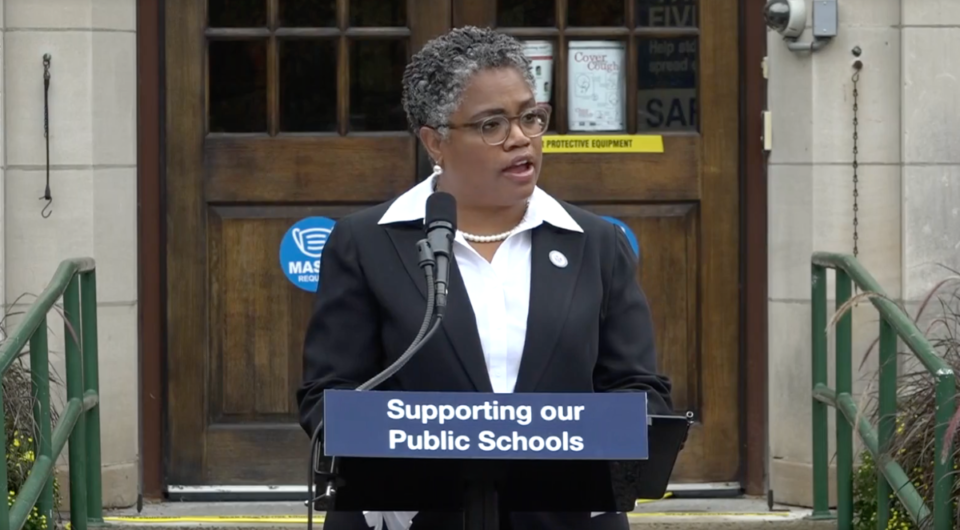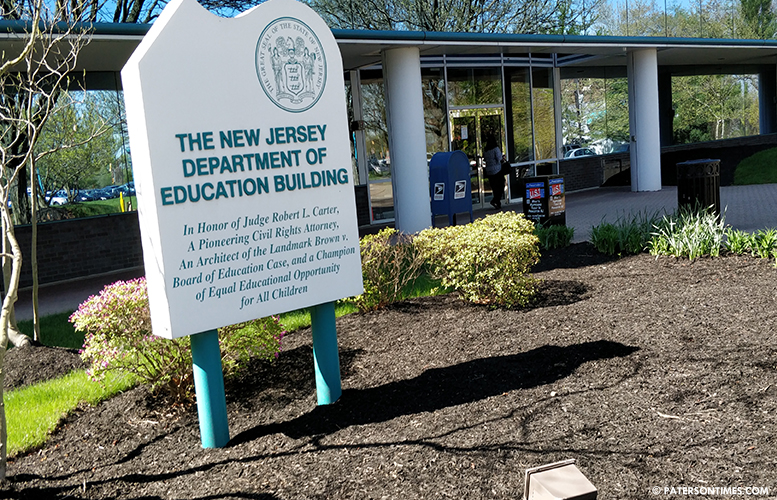QOD: Washington Post Reviews Russakoff’s Book on Newark and Looks Forward
October 21, 2015Duelling School Improvement Plans for De Blasio/Farina and NY Comm. Elia
October 21, 2015N.J. PARCC Drill-Down: Reality Hurts and Common Core Works
The New Jersey Department of Education released the state’s first PARCC results yesterday afternoon. No surprises here: student proficiency scores were lower because the tests are actually aligned with grade-appropriate content, unlike N.J.’s now-defunct ASK and HSPA assessments. As NJ Spotlight reports, “The numbers were stark: Just 44 percent of third-graders and 36 percent of 10th-graders reached or exceeded PARCC’s grade-level marks in language arts.” In math, “just 24 percent of high schoolers met the PARCC mark in geometry test, and 23 percent achieved the standard in Algebra II. No math numbers at any grade level topped 50 percent meeting ‘expectations in the math tests.”
Or as Commissioner David Hespe told the Wall St. Journal, “We promised many years ago a more honest, accurate assessment. We have great challenges ahead.’’ Comm. Hespe also confirmed to the Star-Ledger that “the results show that high school graduation requirements are not rigorous enough for most students to be successful after graduation. The 2014-15 results set a new baseline for improving student achievement.”
“There is still much work to be done in ensuring all of our students are fully prepared for the 21st century demands of college and career,” Hespe said.
A few highlights:
- Younger students reached proficiency cut-offs at higher rates, which indicates that N.J.’s implementation of the Common Core State Standards is raising achievement levels. Older students weren’t exposed to the CCSS for much of their schooling. From another Star-Ledger article: “‘The results are not too surprising,’ said Soundaram Ramaswami, an assistant professor at Kean University and an expert in testing and assessment. ‘Many students in younger grades have been taught under the Common Core, the set of national standards PARCC is testing, since they entered school. So, it is logical they would do better on the exam. You can shape them, mold them much better.'”
- Unlike the ASK and HSPA tests, PARCC results will, according to The Record, “provide more detailed results, showing how students performed on specific skills, which can help families and educators identify strengths and weaknesses and fill instruction gaps.” Lianne Markus, a fourth and fifth grade teacher in Hope Township said that “it could be empowering ”for students to learn where they have strengths and where they have “opportunities for growth.”
- The opt-out lobbying movement, funded by NJEA, national teacher unions, and promoted by Save Our Schools-NJ, (see NJLB coverage here, here, and here) “did not significantly affected New Jersey’s overall results.”
Predictably, those invested in the demise of meaningful assessments linked to teacher evaluations (even at N.J.’s stunningly low rate of 10%) shot the messenger. NJEA immediately issued a press release:
Parents and policymakers alike should be very careful about drawing any conclusions from the data released today, or from the more detailed data that will be released in the coming weeks. As we have said from the beginning, the PARCC test is a deeply flawed assessment tool that was further compromised last year by widespread problems with technology and other issues associated with administering a new, unproven test statewide for the very first time.
Okay. We now know (if we hadn’t already guessed) that our old standardized measure of student proficiency painted a unrealistically sanguine picture of N.J. students’ preparedness for college or careers, borne out by sky-high remediation rates in two and four-year colleges. We also know that the Common Core is working. So, what do we do? Revert back to lower standards and mickey-mouse assessments? Or shoulder onward, all stakeholders – teachers, union leaders, DOE officials, schools, parents – newly cognizant of the academic needs of children?
I vote for the latter. NJEA, apparently, would have us reverse course. So would fellow traveler SOS-NJ, which emitted this piece of tripe: “PARCC results mean absolutely nothing because the PARCC tests have not been validated as useful or predictive of anything.”
Of course, NJEA and SOS would like very much for the PARCC results to “mean nothing,” because that would allow them to complacently continue to promote the canard that schools in N.J. are just fine. You’ll excuse the literary reference to Voltaire’s Candide, ou l’Optimisme where the character Professor Pangloss (get it? pander + gloss) insists, all evidence to the contrary, that “we live in the best of all possible worlds.”
New Jersey is an El Dorado (sorry, still on the Candide kick) of wonderful things. But our public education system, at least if you can’t buy your way into one of our rich suburban school districts, isn’t one of them. And, even there — our Princetons (home base of SOS-NJ) and Mendhams (Common Core flip-flopper Chris Christie’s place of residence), we’re not expecting enough from our kids to adequately prepare them for life outside the nest.
That’s what the PARCC scores tell us. Tests have limitations — just a snapshot of student growth and teacher effectiveness — but they’re important and useful. The trick for parents, teachers, and lobbyists is to stop fighting and start collaborating on how to give our children a shot at their best of all possible worlds.





1 Comment
[…] given in 11th grade as a diploma-qualifying exam, were actually middle school level tests. In 2015 Commissioner David Hespe called PARCC, which replaced HSPA, “a more honest, accurate assessment” that shows our “high […]